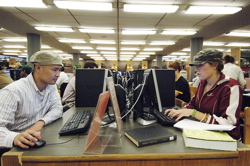Office of IT troubleshooters ensure “everyone gets connected””

Back-to-school weekend typically conjures images of U-Hauls lining Bay State Road or Commonwealth Avenue while students — and their alternately happy and anxious parents — help them unload books, computers, and other essential paraphernalia for the coming academic year. A less familiar image is that of a dedicated cadre of 87 computer experts waiting quietly in the background, ready to help the many new arrivals on the Charles River Campus get their computers up and running.
For the ninth consecutive year, two groups employed by the Office of Information Technology (OIT) — Team ResNet, whose informal motto is “everyone gets connected,” and the Personal Computing Support Center, or PCSC — provided assistance to anyone who needed help getting a computer connected to the campus network. The 55 Team ResNet student consultants and 5 full-time staff provided walk-in support or visited dorm rooms and faculty offices to solve such problems as the presence of spyware on students’ machines. Meanwhile, the PCSC crew of 5 full-time professionals and 22 student consultants was available to solve problems via the center’s bank of phone lines. During the week of September 1 through 7, the PCSC processed up to 70 calls an hour, a total of over 2,600 calls.
While these experts were doing their part to help students and faculty get online, additional related steps were being performed further behind the scenes. To connect any device to ResNet, the Charles River residential network, that device must first be registered. The process is initiated automatically when a new device is plugged into a ResNet Ethernet port. Once registered, each Windows-based PC is then scanned — again, automatically — for security vulnerabilities. BUVS, the scanning utility developed by OIT staff, examines PCs to verify that all current security patches are installed and that no viruses are present. During the first week of move-in, more than 10,000 computer certifications were completed without human intervention. The certifications required the installation of 8,600 Microsoft security updates and the removal or repair of nearly 21,000 infected files.
“The start of the academic year is really the greatest period of risk,” says Michael Krugman, OIT executive director. “You’ve got 11,000 computers that have been off in the wild for months.”
When the dust from move-in settles, members of Team ResNet return to their primary task of running residence hall computer labs and providing on-site support to faculty and staff on the Charles River Campus. The PCSC continues to provide personal computing support to the students, faculty, and staff throughout the year via its Web site, a tutorials program, individual consulting, and a telephone and walk-in support center located in the basement of 111 Cummington St.
There are seasonal peaks and valleys to system use, which ranges from e-mail to people logging into the printing queues in the computer labs. After the initial rush, use drops a few weeks into the semester, then rises after Thanksgiving break, and finally jumps up significantly at the end of the semester, when the computer labs at 111 Cummington St. remain open around the clock for the last two weekends of the year. Students working on final papers account in large part for the demands on the network, but online registration and grading can also result in heavy loads.
In spring, the increased volume comes from both current and future BU students — the online sign-up for housing draws a virtual crowd, as do the admissions decisions posted on the Web, which applicants can view by logging in. And over the summer, the Early Bird account program allows new students to sign up for an account before arriving on campus, while the University Computers back-to-school sales program keeps everyone associated with the store busy.
William Stewart is the assistant to the vice president for information systems and technology.
Jessica Ullian staff contributed to this article.